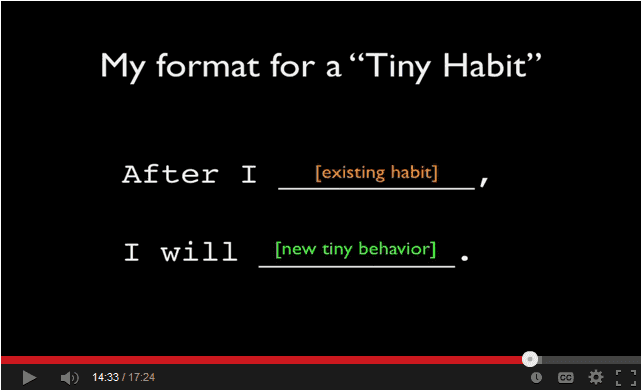Experiments in Tiny Habits
3 minsI once audited a class at Stanford.
The year was 2007. I was in the midst of a startup (Graspr.com – an attempt to create a ‘howto slice’ of Youtube), yet I was intrigued enough to take that class.
It was no ordinary class.
Dr. BJ Fogg, a psychology professor and Director of the Stanford Persuasive Technology Lab, was offering a new (possibly one-time) course – Psychology of Facebook. Fogg’s recent claim to fame was his earlier class (Building Facebook Applications) which he co-taught (I think with Dave McClure). That class produced many apps that reached millions of downloads within weeks and I think a few went on to become companies as well.
For this follow-on (Psychology of Facebook) course, Fogg wanted an industry mix in his classroom and made interested participants fill out a brief questionnaire. I must have contributed something insightful (or witty) because I was ‘accepted’.
It was quite a fascinating course and something that warrants a separate post (short version: I ended up reading Robert Cialdini’s Psychology of Persuasion in about 3 sittings). Suffice to say that after class got over, I kept regular tabs on Dr. BJ Fogg and Persuasive Lab’s work.
 A few years later, after we had moved to Bangalore, I learnt about his latest innovation around behavior change – Tiny Habits. I promptly signed up for his remote 2-week Tiny Habits workshop. The essential principles around this innovation were:
A few years later, after we had moved to Bangalore, I learnt about his latest innovation around behavior change – Tiny Habits. I promptly signed up for his remote 2-week Tiny Habits workshop. The essential principles around this innovation were:
- It’s incredibly hard to form new habits (Duh! you knew that already, right?)
- Any habit that requires motivation is doomed. You might not fail on day#2.. you might even make it to month#10 but fail you will. Eventually.
- Individuals need to first get into the habit of creating habits. Sounds like a mouthful? Bear with me for just a bit..
- How does one create habits that DO NOT require motivation and yet can sustain in the long term?
- Answer: Tiny habits
- A tiny habit is a habit that requires no more than 2 minutes to execute and is anchored to a deterministic daily event
- Examples of anchors: rolling out of bed, brushing teeth, taking a leak
- Examples of tiny habits:
- After I roll out of bed, I will do exactly 2 push-ups
- After I finish brushing teeth, I will floss one tooth
- After I finish my bath, I will fold two items of clothing
- During this tiny habit phase (of getting into the habit of creating habits), it’s NOT important what the tiny habit is… what’s important is to establish that automatic response:
- Anchor event X happens
- Mind reminds you that you have to do tiny habit Y.
- After you automatically do this (what Robert Cialdini calls the “Click… whirr” sequence) for 3-4 weeks, you become a believer. In tiny habits.
- The word automaticity seems appropriate to describe this phenomenon but those clever word jocks at Webster haven’t bought into it yet.
- Once you have established tiny habit formation (for a handful) and you’ve done them for 3-4 weeks, it’s time to get ambitious and convert to a regular habit, albeit gradually.
- For example, increase 2 push-ups to 3.. to 5 and so on.
My brief experiments
- [Success] I anchored my push-ups to “rolling out of bed”.
- From my wife’s vantage point, the reaction changed from ‘alarmed’ to “he really CAN get nuttier than he already is”
- After a few weeks of promising results, I raised the ante — 5 per day all the way up to 75 pushups. I then reduced it to 50 (to sustain for a longer period). Two months later I stopped. The point had been proved but I also realized that biceps and triceps are vanity muscles and.. what’s the point if it didn’t make me a better runner? My next tiny habit anchored to the same “rolling out of bed” event will most likely involve planks.
- [Failure] Tiny habit was “watch a Khan Academy after bidding good night to kids”. This had a rough start and barely sustained for the minimum 2 week period. For the simple reason that it violated the “tiny” habit principle. Watching a Khan Academy video is at least 5-7 minutes.
- [Middling success] At the peak of my push-ups obsession, I created another tiny habit (inspired by a @bjfogg tweet) – after coming out of the rest room, I will do ten push-ups. I enjoyed this, especially since I had to explain myself to my colleagues at work.
Closing Thought
If you are like me… as in struggling to balance insane work pressures, spending quality time with your spouse and kids, and holding on to that one rhythmic act of sanity restoration (running/squash/yoga/dancing/[something]) and you want to extract 30 min more per day? Forget it, it ain’t gonna happen.
What may be possible is to find six anchor points during the day.. create and sustain 5-min duration tiny habits.. and if those tiny habits do sustain, coalesce a few of them into a 15-min routine.